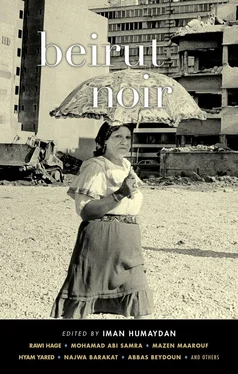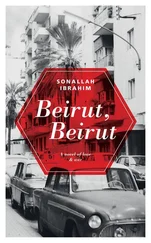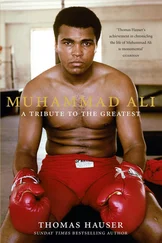When I drove her car, a blue Renault 20, for the first time, I opened the back door for her and she smiled and said, “I’m not a leader, a government official, or a diplomat — why are you doing that?! I’ll sit next to you.”
I didn’t know what to do when escorting her around. “Come with me, don’t wait in the car. If you’re bored of our conversation, read this book in another room.” Or she’d tell me during lulls in the artillery shelling that her friends’ balcony in Ain el Mreisseh is nice and overlooks the sea.
At that time, I still couldn’t recognize that she wasn’t inviting me to be a kind of friend, that she only took notice of me because of her kindness. Her behavior was different from the comrade-leaders’ instructions ordering me, as an escort, to act as her equal. They didn’t care much about what we did. Hours passed with us waiting in places far from their meetings, languishing in cars — bored, anxious, staring at passersby — searching for a camouflaged assassination team, with our hands on our machine guns laid out on our knees, or standing in the doorways and entrances of buildings.
She asked me if I knew À la recherche du temps perdu by Marcel Proust. I answered that the French literature course we had in the Lebanese baccalaureate program stopped at Baudelaire. She smiled and said, “You all are a little conservative.”
“He’s the pioneer of the nouveau roman,” she then told me when she gave me Alain Robbe-Grillet’s novel La jalousie . “I should’ve started with Les gommes, which contains the declaration of this new literary trend, but I lost my copy, I’ll look for it again.”
When we were alone in the few repertory cinemas in the Hamra district, my breathing would get shallow as I monitored my silence next to her. I didn’t dare turn toward her, except to look out of the corner of my eye, until I wished I were cross-eyed. My God, how unjust you are! I didn’t want to interrupt this impossible happiness. This used to happen at least once a week. I’d feel less anxious when her friends would accompany us, as she’d be less likely to notice what my facial expressions gave away.
Three times, her breath came close to my face unintentionally. Two times because of cannon shelling coming from the other side, and the third a nearby explosion. This is how I tasted her perfume, the sweat of her fear, her summer shirt, her chest, the feel of her arms, and the viscosity of the gods. After those two minutes, taking refuge in my instinct to remain, she then emerged with a slow, gradual distancing of her two scrutinizing eyes — since her body was still whole — before exposing her smile: “Nothing, it’s only a warning. I’m a statue, I’m a willing tool, I’m an ice-age nebula, please sympathize with me and do not look at me as a human being.”
Margot didn’t just introduce me to Citizen Kane and new cinema — Death in Venice, A Clockwork Orange , Truffaut, Fellini’s Amarcord , and The Godfather by Francis Ford Coppola — but also to a more diverse world through the films we watched together on party missions, like Battleship Potemkin and 41 Bullets . The language of books, movies, novels, and the faces of Margot’s friends segued from my mission to my insides. A combatant doubting the war, its words, its beauty, and its weapons. A Party loyalist searching for something outside the party in passion, in madness, in silence.
She became all of my time. When I waited in “my” big apartment, empty of everything but her ghost. Or in her apartment when she sometimes invited me to share a French meal with her, or when I went out to survey the area around the house and speak to the people who knew me by my assumed name and knew that I was guarding the doctor’s house and escorting his wife around, or when I lingered around reading in a room or on the balcony of one of her friends’ places, or when I drove or exercised by her side on the Corniche near the lighthouse in the morning when the bombardments had decreased, or when I was swimming near her at Sporting because she invited me to: “Did you come to just sit there like that? Come on, enjoy the sunshine and water and forget the shelling.” Or when I spied on her body, modestly and bashfully, watching her joking with her friends and acquaintances. She became all of my time that had changed. Even when Comrade Jalal conveyed his messages, fearing my incipient forgetfulness, I started asking him to write them down: “Comrade, I am afraid I won’t do the job the way it should be done.” He’d answer me, without suspecting the real reason, that he didn’t like writing as it could be dangerous, though sometimes he’d give in to my request.
My eyes: hazel-colored, not at all like my Uncle Elia’s green eyes that were a bit blueish. My maternal aunts, grandmother, and my mother always said that because of this, he alone deserved the most beautiful and richest young woman in the area. We lost him. But he didn’t care. He had an adequate horde of women when he sadly approached fifty without having married or produced a descendant or heir. We kept searching and suggesting women to him but he always responded, “Why do you all want me to be chained to one woman for the rest of my life? I am a man who loves freedom and fun. Children... for what? What use are they? What use have I been to my father?”
Height: 165 cm. Very short, not fit for the police, only for the army corps.
Educated, enrolled as a second-year student in the social sciences at the UNESCO campus. Most of my professors are comrades in the Party or the Lebanese National Movement and aren’t bothered by my repeated absences from classes. They understand who I am. I live off my work, officially a secretary in the department of social affairs, but I haven’t gone to the office since the area it’s located in became hostile.
Sect: means nothing to me. I scratched it off my identity card three years ago. In any case, I gave up using the card after “Black Saturday,” and since then I’ve only used the card of a comrade in the Democratic Front. My name on that one is Mustapha Masoud. This means I have several assumed names: Steif to friends, Abu Sakhr to everyone else, and Abu Sukhur, the affectionate version, for my closest comrades. Comrade Kamel, who works as an Arabic-language professor at the Faculty of Arts in the Lebanese University and is responsible for bringing us culture, called me this when he saw me on my first military training mission in the south. “You, comrade, are a qabaday, your body is like a rock, so you are Abu Sakhr — father of the rock — not the rock of Saint Peter upon which Jesus built the first church, but Communist ones.” My father and my grandmother again.
Abu al-Izz, I know you will tell Abu Khalid everything: my eyes won’t carry the great emptiness coming, embroidered with death. I stare at it and it colors me in hell. I embrace its body stretched out in my words. From the beginning of this night, you ask me, “What if I were ill?” And I couldn’t talk to you and answer your questions while I drank myself into a stupor. I know that you opened up an investigation and that you won’t close it until you know everything. Therefore, note that I wanted you to talk to me about this. You will say that you didn’t do it because you didn’t know anything. Was it up to me to talk? The glasses of whiskey that I choked back all afternoon hit me like shelling in the Battle of the Hotels. A 60mm mortar cannon can damage a nearby building from behind, even when you can’t see it directly. In this way, I aim my shot glasses at a place that I can’t see myself and scorch it with gunpowder. Twenty, thirty shots that night became my only bridge to the spectators. It was as though, for all my desire and lust, I was nothing but a step on a tall ladder whose rungs broke each time I climbed up them, causing me to fall. Comrade, I want her to stay and I know it’s impossible. I’ll go mad, I’ll kidnap her, but how and where will I go with her? I’ll kill him... This won’t make her love me, and the Party will punish me and never forgive me. I’ll kill both of them and commit suicide. I’ll press my hand against her neck and squeeze firmly while my lips speak to her lips in that sex that I imagine overflows in her sentiments.
Читать дальше












